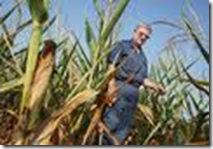EFLAND — There’s an old saying, it’s not the heat. It’s the humidity.
But farmers in Orange County are saying, no, it really is the scorching temperatures.
"If we had to tag one thing, it would be heat," said Morris Shambley, owner of Shambley Farm on Mt. Willing Road in western Orange County.
Of course, the rainy spring season, which prevented farmers from putting their crops in on time, then the lack of rain after that certainly didn’t help, he said.
On Friday, he stood in his cornfield, where he grows 400 acres of field corn, and peeled back the husks of the corn to show how the heat had affected the pollination of the grain crop.
The yellow kernels did not fully cover the ear, and on some of them, only half as many as normal had formed.
"It’s about as bad as I’ve ever seen it," he said.
The pollination problems were caused by the extreme heat, according to Carl Matyac, the N.C. Agricultural Extension agent for Orange County.
When it’s so hot, the tassels on the corn don’t stand up the way they should, so the pollen doesn’t fall down into the follicles in the ears of corn properly causing incomplete pollination.
Good pollination will create an ear of corn that is 35 kernels long and 16 to 17 kernels around, Shambley said.
As he inspected the corn in his field, he saw that they were 16 kernels around but far from 35 kernels long, he said.
Shambley expected his corn crop would be 50 percent of what he would have hoped for. Yet, even as he looked at his corn on Friday, he saw signs he could be in for more trouble down the line — alfatoxins, a fungus that could infect the ear before it’s harvested.
If he takes it to the mill, and the operators test it and find out the alfatoxins exceed regulations, the crop could go straight down the drain, he said.
Field corn is ground up for feed.
"It’s a touchy situation with the corn this year," Shambley said. "We’re going to get into some territory we’re not used to. We have to make some decisions."
Shambley also grows 500 acres of soybeans, and he expects that crop will come in 35 to 40 percent less than normal, and the 225 acres of hay he is growing likely will be half of what he expected.
The 200 acres of his wheat crop, however, had a good yield, he said.
He expects the heat and drought will cost him tens if not hundreds of thousands of dollars this year.
Small farms have been experiencing problems with their vegetable crops, although many farmers can irrigate because they plant very small plots compared to the hundreds of acres that Shambley farms.
Bill Lelekacs, who owns Dancing Pines Farm on Buckhorn Road, is a part-time farmer who has a full-time job off the farm, so he can work on his farm only on the weekends and in the evenings.
He grows vegetables for farmer’s markets and some restaurants.
He’s lucky, he said, because he has two ponds on his property that he can use to irrigate his two acres of crops.
The problem, which is the same one Shambley has, is that it’s too hot to work outside in the fields.
"The biggest thing this summer is my energy level has been down," he said. "It’s been difficult working in the extreme heat."
Like Shambley, he tries to get started very early but has to quit working outside by noon — it’s just too hot.
He has seen some signs of damage to some of his peppers and tomatoes from the heat, but generally his crops have fared all right, he said.
"Other than that, everything else is doing pretty well because we do irrigate, so we’re lucky because we have some control," he said.
Shambley says on his farm, God’s in control.
"That’s farming," he said. "We got to go with the flow.
http://heraldsun.com/bookmark/14899468


Deprecated: strpos(): Passing null to parameter #1 ($haystack) of type string is deprecated in /home/agriviek8Qv/agriviet.net/public_html/wp-includes/comment-template.php on line 2522